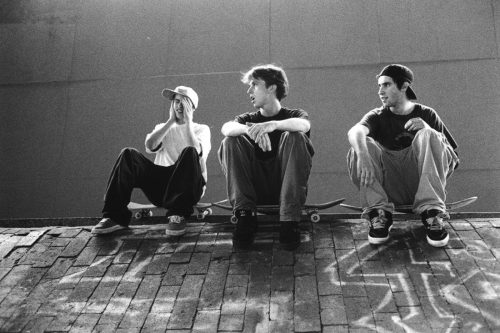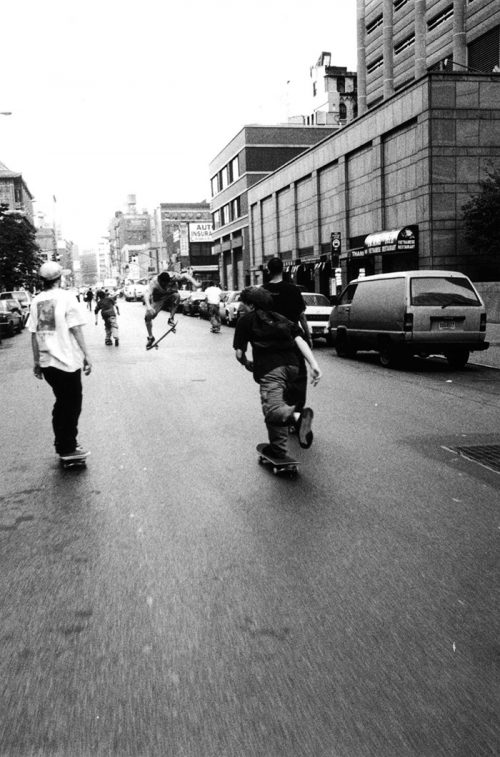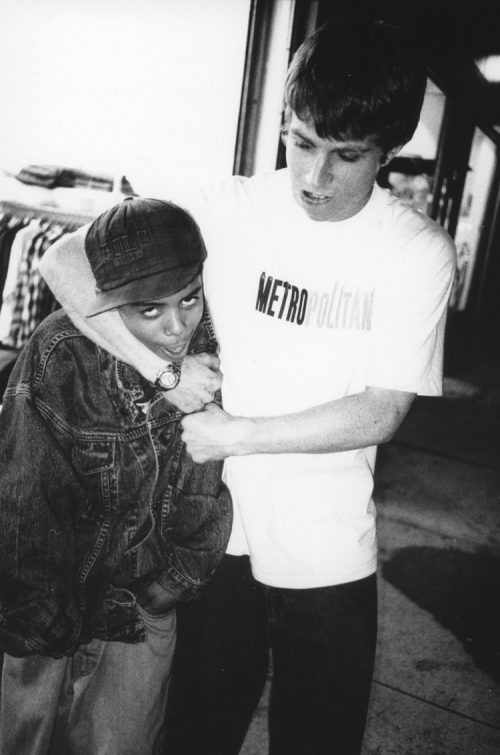The internet has given plenty of pros, videos and companies — or at least an idealized version of them — a second life. Case in point: Metropolitan was a Deluxe-distributed wheel brand that ended in the mid-nineties. It began its second internet life on the pages of Police Informer, a defunct Blogspot page of largely east coast-centric magazine scans before Chromeball took the torch over in 2010. The company’s ads were black and white portraits of skateboarding in New York shot by Ari Marcopoulos, with a distinct non-skate photographer take on the traditional skate ad.
Since then, those iconic ads have been reblogged, regrammed and reposted in every place possible, oftentimes by people too young to have ever ridden a set of Metropolitan wheels. After seeing a few glimpses of Metropolitan gear that was a bit too clean to be vintage throughout the past year, we learned that Keith Hufnagel, one of the original teamriders for the brand, is relaunching it altogether.
For those don’t know, what was Metropolitan?
Metropolitan was a wheel company. Deluxe was doing Spitfire in the early nineties, and they decided they wanted to have a brand that was more east coast driven. They realized they weren’t getting much traction on the east coast. It was Jim Thiebaud, Chris Pastras, and a few others who developed Metropolitan, which only featured east coast skaters. It was myself, Ryan Hickey, Maurice Key, and a bunch of other guys.
It was a cool but very short-lived company. Spitfire was doing well, Metropolitan was doing decent, and they had to make the decision on which to run with. Spitfire was the stronger brand, so they continued to go with it. We were all heartbroken because we all thought Metropolitan was the best brand ever. It was around for three or four years, but I’m not positive.
Was there any reason as to why Deluxe wanted to start a wheel company as opposed to a board brand?
I’m not sure. Deluxe has done a lot of off-shoots that were board companies. They did Stereo, they did Rasa Libre. Some stayed, some went away. I’m not sure why they didn’t approach Metropolitan as a board company, but maybe their plate was too full.
What was riding for the company like? It was just ads — no videos, trips or anything, right?
It was only ads in magazines. They made wheels, hats, tees, and sweatshirts; I remember they tried to do swishy pants and nylon jackets for it. Ari Marcopoulos was the photographer behind it for a long time. He’d shoot all the ads, Todd Francis would do all of the art, and Dune would manage a lot of the New York skaters.
A lot of younger people don’t remember a time when sustaining as an east coast brand was not an actual possibility outside of a few anomalies. What was so different about that era that west coast companies specifically had to target an east coast aesthetic?
New York is an island that’s three thousand miles away from the center of skateboarding. You’d have to film stuff, edit it at home, and send it out there for people to see what was happening out east. We’d buy videos of what was happening in California. They were progressing further and more up-to-date than we were because they were more “in it.” People on the east coast were either creating their own thing, or taking stuff from California once it reached them and tweaking it in their own way. Back then, it was more obvious that someone was an east coast skater versus a west coast skater.
In Ryan Hickey’s Chromeball interview from earlier this year, he said that he never considered the skaters from New York who moved to California in order to turn pro as “New York pros.” Was there a tension back then between the dudes who stayed out east versus who moved to the west coast?
That was the first time I had heard of anything like that. I left New York for California to turn pro out there. At that time, based on all the videos and magazines, California was the shit: it was where everything was happening. In New York, people were making their own scene, but I never even thought it mattered if you stayed in New York or not. New York was just hard to skate in the winter. If it’s something you want to do year-round, you had to travel to somewhere warmer.
But I never thought of it how he did. Over time, I’d come back to New York to visit, and everyone would be stoked to hang out. There were never any bad tensions.
After nearly twenty years, where did the idea to re-launch the company come from?
Skaters always question, like “What happened to that brand?” I’d always think about Metropolitan in the back of my head. I’d ask Jim, “What are you doing with the brand?”
You mean like the rights to the name and the logistical end of it?
Yeah. He’d tell me they weren’t doing anything with it. I made a deal with him to take on the brand and everyone was stoked. I wanted something different from the HUF world. I’ve been protecting it, trademarking it, and doing a very slow launch of it. It’s a side project that I have a lot of passion for.
Are you trying to pick up where it left off with all the classic designs, or are you going to take another route with it?
Everything always has a new direction, but I want to keep it authentic to what it was. Except, I don’t want to go out there and build a wheel company. I want to build an apparel company; wheels are down the totem pole for me. I’d rather do rad apparel for people to be hyped on. The competition is too stiff out there for wheels.
Is it going to stay a New York-centric thing?
Over time, I’ll start a team, but for now, I’m just hooking up people from all over. I want it to be something people search out. Everything is U.S. and Canada made for now and I hope I can keep it that way. Everything’s going to be good quality and made in small runs to make it special for the people who want to rock it. It’ll always have its New York roots though.
Is anyone else from the original company involved with the re-launch?
Ari actually did the first lookbook, but it’s mostly just blessings from a lot of those people.
Is there a particular reason you’re picking up this project now? There are obviously a bunch of successful niche-oriented companies in skating now.
I like what HUF has been built up to now, but I really enjoy the beginning of the process in creating something. For me, I get that rush of starting something new by doing Metropolitan on the side. I don’t have anyone to answer to. If I want to do something that’s expensive and isn’t going to sell, I can. There are no rules at this stage. It’s a comfortable creative outlet. The HUF part is super fun, but it’s just at an entirely different level.
The nineties worship in skating is really obvious at this point, but we’re all guilty of it. Is there one image, ad, trick or part for you that really sums up the vibe and aesthetic of that era more than anything else?
Oh man. I’d say anything from the Brooklyn Banks contests that Vinny Raffa used to throw. Everyone had baggy pants on. I remember I had pants on that fully fit over my shoes. Pants are baggy now, but these were insane.
You can follow the relaunch of the brand via @metropolitanUSA or on MetropolitanUSA.com.









Massive disrespect at Chrome Ball for calling out police informer in the Steven Cales interview. Dude focused shortly after and we lost a tonne of dope stuff.
i’m pretty sure that was so cales himself had a chance to clear his name up.
imagine people googling your government name and the first thing they see is a page called police informer
More than anything else in the interview, Cales was most adamant about that being in there.
He told me, off the record, about the PI name getting him into some serious situations on more than one occasion. I was just letting him say his piece.
Having said that, I never thought the site would be taken down as a result.
^ not cb’s fault
I look forward to Metropolitan weed socks and vibrator collabos.
Who cares. You put someone’s name out on a site called Police Informer. He’s probably going to say that. It’s not like you licensed the photos with the skaters or used his permission to put him in a compromising situation.
Yall canadians just lucky he didnt come knockin for ya.
steven cales interview on the chromeball is super cool.go read it!
really good job over here at the quartersnacks,too.
thanks for the good content.